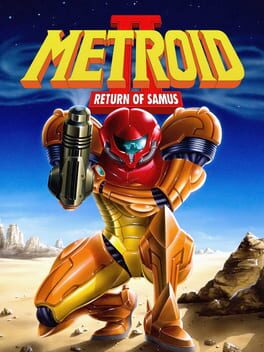The violence of the machine expressed further, dimmer now that the lights are off. Samus is no longer liberating a planet from its oppressor, she has become the cruel fascist, destroying all life. In her first outing, she did this as well - but it was all under the pretense of helping fight the Space Pirates. Here, she gives into them.
The premise of Metroid II is framed around an extermination order against the Metroid species so that they can "never be used as biological weapons again". Instead of questioning this decision, Samus relents, and we enter the torturous, sickly green spaces of SR-88. There is no joy to be had here, no pleasure to be taken in the act of killing.
The game is repetitive and numbing, with no end in sight to the slaughter of a life form. Right up until the very end, where Samus finally grows a conscience after executing a Metroid's mother right in front of it. This moment, where the baby begins to follow you back out of SR-88, is odd in its juxtaposition. It's calm but also anxious. There's a tension here: why did Samus grow a conscience now? Why is the act of walking past all those she killed so relaxing?
And so a perpetrator of systemic violence is allowed to choose which are "worthy" to survive. She is allowed her "moment of conscience." The cycle begins anew.
The premise of Metroid II is framed around an extermination order against the Metroid species so that they can "never be used as biological weapons again". Instead of questioning this decision, Samus relents, and we enter the torturous, sickly green spaces of SR-88. There is no joy to be had here, no pleasure to be taken in the act of killing.
The game is repetitive and numbing, with no end in sight to the slaughter of a life form. Right up until the very end, where Samus finally grows a conscience after executing a Metroid's mother right in front of it. This moment, where the baby begins to follow you back out of SR-88, is odd in its juxtaposition. It's calm but also anxious. There's a tension here: why did Samus grow a conscience now? Why is the act of walking past all those she killed so relaxing?
And so a perpetrator of systemic violence is allowed to choose which are "worthy" to survive. She is allowed her "moment of conscience." The cycle begins anew.
Reviewed on Feb 14, 2023
